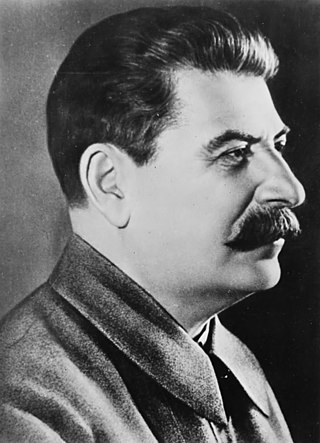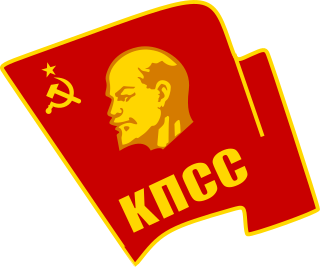Related Research Articles

The history of the Soviet Union from 1982 through 1991 spans the period from the Soviet leader Leonid Brezhnev's death until the dissolution of the Soviet Union. Due to the years of Soviet military buildup at the expense of domestic development, and complex systemic problems in the command economy, Soviet output stagnated. Failed attempts at reform, a standstill economy, and the success of the proxies of the United States against the Soviet Union's forces in the war in Afghanistan led to a general feeling of discontent, especially in the Soviet-occupied Baltic countries and Eastern Europe.

Perestroika was a political reform movement within the Communist Party of the Soviet Union (CPSU) during the late 1980s widely associated with CPSU general secretary Mikhail Gorbachev and his glasnost policy reform. The literal meaning of perestroika is "restructuring", referring to the restructuring of the political and economic systems of the Soviet Union, in an attempt to end the Era of Stagnation.

The Soviet Union, officially the Union of Soviet Socialist Republics (USSR), was a transcontinental country that spanned much of Eurasia from 1922 to 1991. The country was a successor state to the Russian Empire; it was nominally a federal union of fifteen national republics, the largest and most populous of which was the Russian SFSR, but in practice both its government and its economy were highly centralized until its final years. As a one-party state governed by the Communist Party of the Soviet Union, it was a flagship communist state.

Leonid Ilyich Brezhnev was a Soviet politician who served as General Secretary of the Communist Party of the Soviet Union from 1964 until his death in 1982, and Chairman of the Presidium of the Supreme Soviet from 1960 to 1964 and again from 1977 to 1982. His 18-year term as General Secretary was second only to Joseph Stalin's in duration. To this day, the value of Brezhnev's tenure as General Secretary remains debated by historians. While his rule was characterized by political stability and significant foreign policy achievements, it was also marked by corruption, inefficiency, economic stagnation, and rapidly growing technological gaps with the West.

The Sino-Soviet split was the gradual deterioration of relations between the People's Republic of China (PRC) and the Union of Soviet Socialist Republics (USSR) during the Cold War. This was primarily caused by doctrinal divergences that arose from their different interpretations and practical applications of Marxism–Leninism, as influenced by their respective geopolitics during the Cold War of 1947–1991. In the late 1950s and early 1960s, Sino-Soviet debates about the interpretation of orthodox Marxism became specific disputes about the Soviet Union's policies of national de-Stalinization and international peaceful coexistence with the Western Bloc, which Chinese founding father Mao Zedong decried as revisionism. Against that ideological background, China took a belligerent stance towards the Western world, and publicly rejected the Soviet Union's policy of peaceful coexistence between the Western Bloc and Eastern Bloc. In addition, Beijing resented the Soviet Union's growing ties with India due to factors such as the Sino-Indian border dispute, and Moscow feared that Mao was too nonchalant about the horrors of nuclear warfare.

The General Secretary of the Central Committee of the Communist Party of the Soviet Union was the leader of the Communist Party of the Soviet Union (CPSU). From 1924 until the country's dissolution in 1991, the officeholder was the recognized leader of the Soviet Union. Officially, the General Secretary solely controlled the Communist Party directly. However, since the party had a monopoly on political power, the General Secretary de facto had executive control of the Soviet government. Because of the office's ability to direct both the foreign and domestic policies of the state and preeminence over the Soviet Communist Party, it was the de facto highest office of the Soviet Union.

The New Communist Party of Britain is an anti-revisionist Marxist–Leninist communist party in Britain. The origins of the NCP lie in the Communist Party of Great Britain from which it split in 1977. The organisation takes an anti-revisionist stance on Marxist–Leninism and is opposed to Eurocommunism. After the fall of the Soviet Union the party was one of two original British signatories to the Pyongyang Declaration in 1992. It publishes a newspaper named The New Worker.

Nikolai Viktorovich Podgorny was a Soviet statesman who served as the Chairman of the Presidium of the Supreme Soviet, the head of state of the Soviet Union, from 1965 to 1977.

Alexei Nikolayevich Kosygin was a Soviet statesman during the Cold War. He served as the Premier of the Soviet Union from 1964 to 1980 and was one of the most influential Soviet policymakers in the mid-1960s along with General Secretary Leonid Brezhnev.

The "Era of Stagnation" is a term coined by Mikhail Gorbachev in order to describe the negative way in which he viewed the economic, political, and social policies of the Soviet Union that began during the rule of Leonid Brezhnev (1964–1982) and continued under Yuri Andropov (1982–1984) and Konstantin Chernenko (1984–1985). It is sometimes called the "Brezhnevian Stagnation" in English.
The People's Control was a semi-civic, semi-governmental organisation in the Soviet Union with the purpose of putting under scrutiny the activities of government, local administrations and enterprises. It traces its roots back to Rabkrin, established in 1920.

The history of the Soviet Union from 1964 to 1982, referred to as the Brezhnev Era, covers the period of Leonid Brezhnev's rule of the Union of Soviet Socialist Republics (USSR). This period began with high economic growth and soaring prosperity, but gradually significant problems in social, political, and economic areas accumulated, so that the period is often described as the Era of Stagnation. In the 1970s, both sides took a stance of "detente". The goal of this strategy was to warm up relations, in the hope that the Soviet Union would pursue economic and democratic reforms. However, this did not come until Mikhail Gorbachev took office in 1985.

The Ministry of External Relations (MER) of the Union of Soviet Socialist Republics (USSR) was founded on 6 July 1923. It had three names during its existence: People's Commissariat for Foreign Affairs (1923–1946), Ministry of Foreign Affairs (1946–1991) and Ministry of External Relations (1991). It was one of the most important government offices in the Soviet Union. The Ministry was led by the Minister of Foreign Affairs prior to 1991, and a Minister of External Relations in 1991. Every leader of the Ministry was nominated by the Chairman of the Council of Ministers and confirmed by the Presidium of the Supreme Soviet, and was a member of the Council of Ministers.

The history of Soviet Russia and the Soviet Union (USSR) reflects a period of change for both Russia and the world. Though the terms "Soviet Russia" and "Soviet Union" often are synonymous in everyday speech, when referring to the foundations of the Soviet Union, "Soviet Russia" often specifically refers to brief period between the October Revolution of 1917 and the creation of the Soviet Union in 1922.

The Khrushchev Thaw is the period from the mid-1950s to the mid-1960s when repression and censorship in the Soviet Union were relaxed due to Nikita Khrushchev's policies of de-Stalinization and peaceful coexistence with other nations. The term was coined after Ilya Ehrenburg's 1954 novel The Thaw ("Оттепель"), sensational for its time.

The Central Committee of the Communist Party of the Soviet Union was the highest organ of the Communist Party of the Soviet Union between two congresses. According to party statutes, the committee directed all party and governmental activities. The Party Congress elected its members.

The All-Russian Sociopolitical Movement of Women of Russia (MWR) was a Russian feminist civic and political organisation founded by Ekaterina Lakhova in November 1996.

The Union of Women of Russia was a women's political organisation in Russia. Its leader was Alevtina Fedulova.
References
- 1 2 Engel, Barbara Alpern (1987). "Women in Russia and the Soviet Union" . Signs. 12 (4): 791. doi:10.1086/494366. ISSN 0097-9740. JSTOR 3174213. S2CID 144091323.
- 1 2 3 4 Corigliano, Norma Noonan; Noonan, Norma C.; Nechemias, Carol (2001). Encyclopedia of Russian Women's Movements. Greenwood Publishing Group. pp. 190–192. ISBN 978-0-313-30438-5.
- 1 2 3 Racioppi, Linda; See, Katherine O'Sullivan (1997). Women's Activism in Contemporary Russia. Temple University Press. p. 108. ISBN 978-1-56639-521-2.